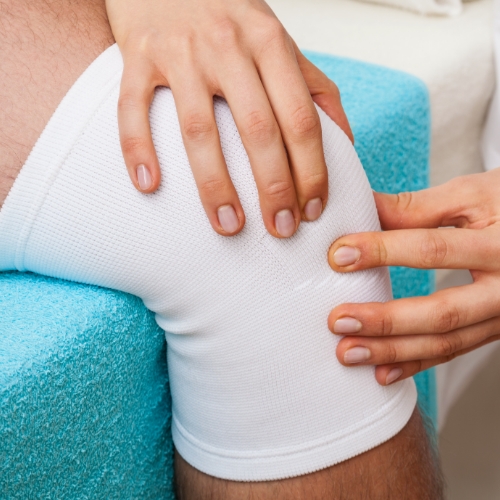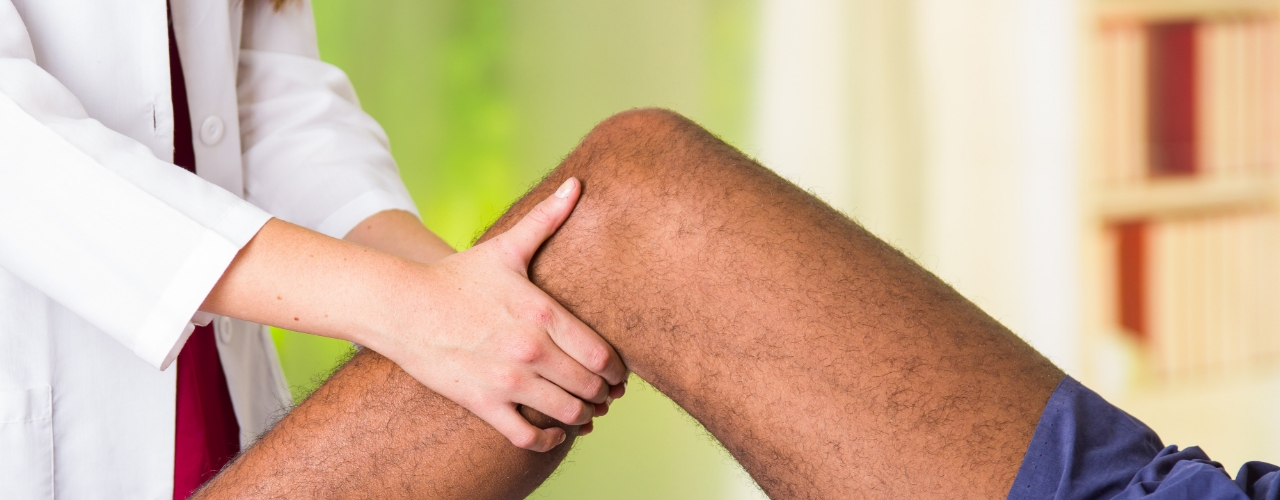Say Goodbye To Knee Pain With Physical Therapy!
Have you noticed that going up and down stairs seems more and more difficult? Do you search for a parking spot close to the store entrance out of concern for your knees? If you’re searching for a clinic that focuses on knee pain relief, Maximum Rehabilitation Services in Chicago, IL, Evergreen Park, IL, or Munster, IN can help. We provide a research-backed approach and prioritize an accelerated recovery to help you reach your peak performance!
No matter how tempting it may be to limit your everyday activities to avoid knee pain, it won’t likely help your knees and may worsen them. Our evidence-based approach focuses on achieving measurable outcomes to optimize your results. We’ll set clear, quantifiable goals and use the most effective interventions backed by science.
The team at Maximum Rehabilitation Services can help you find knee pain relief while improving your mobility and strength to function at your peak ability.
Why does my knee hurt?
At Maximum Rehabilitation Services in Chicago, IL, Evergreen Park, IL, or Munster, IN, we know that the knee joint relies on the joints above (hip) and below (ankle/foot) to function properly. Knee pain can be a sign of a problem elsewhere in the body. Our therapists will thoroughly assess and optimize your function to ensure you achieve measurable results and maximize your physical performance.
Your knee is called a hinge joint that bends and straightens. These motions are the product of the complex coordination and timing of muscles, nerves, and bones. Limitations, weaknesses, and restrictions in tissues can affect the function and ability of the knee.
If you have knee pain, you will not be able to move as freely as you would like. Although it might seem counterintuitive, there are times when knee pain is not the source of your problem. Symptoms in your knee can alert you to a problem in the foot or hip region. There are, of course, times when the knee pain you feel is due to an actual issue/injury in the knee itself.
Fortunately, at Maximum Rehabilitation Services in Chicago, IL, Evergreen Park, IL, or Munster, IN, our physical therapists use an evidence-based approach to get to the root of your problems. Our therapists take measurements to establish baselines and to track progress, including the following:
- Range of motion
- Strength
- Balance, coordination, and agility
- Speed, power, and endurance
- Perception-reaction
- Functional movement patterns and physical performance testing
Once we identify all the factors associated with your condition, we’ll target each issue with proven techniques. Our results-driven focus will help to accelerate your recovery and provide lasting relief for your knee.
Knee pain can be caused by a variety of factors, the most common include:
Arthritis: The most common type of arthritis for knee pain is osteoarthritis (OA). This condition occurs when the cartilage surrounding your joints deteriorates, and the joint no longer has a sufficient cushion between the bone. This leads to joint inflammation, with varying pain levels, stiffness, and reduced mobility.
Cartilage Injuries: There are two common cartilage injuries:
- Meniscus injury: The meniscus serves as a shock absorber and helps maintain stability in the knee. A meniscus tear can be caused by contact or non-contact activity when the knee twists suddenly while bearing weight on it. Some tears are the result of wear and tear.
- Articular cartilage injury: The articular cartilage is a smooth covering on the bones that allows for frictionless sliding of one bone on another. Articular cartilage is injured by direct trauma or wear and tear.
If you twist your knee quickly while bearing weight or sustain other trauma, the cartilage may be injured. It is also possible for prolonged inactivity or repetitive movements to cause fraying and eventually tearing of the cartilage.
Ligament Injuries: Our bones are connected by ligaments. The ligaments in your knee act like leather straps to hold the bones together and keep your knee stable. Ligament injuries are often caused by sudden stops and twists or direct blows to the knee.
- Anterior cruciate ligament (ACL): It is located in the center of the knee and controls the rotation and forward movement of the shin bone.
- Posterior cruciate ligament (PCL): It is located in the back of the knee and controls the backward movement of the shin bone.
- Medial collateral ligament (MCL): The medial collateral ligament is on the inside of your knee and provides stability to sideway motions.
- Lateral collateral ligament (LCL): The lateral collateral ligament is on the outside of your knee and provides stability to sideways motions.
Understanding Common Causes of Overuse-Type Knee Pain
- Tendinitis: Your tendons are thick connective tissues that attach muscles to bones. Tendinitis occurs when the tendon becomes inflamed due to repetitive movements. It is common in jumping and landing motions and sports like skiing, cycling, or hurdling. The patellar tendon connects the patella (kneecap) to the shinbone, allowing you to kick, run, and jump. Patellar tendinitis is common in runners, skiers, cyclists, and those engaging in jumping sports. Knee tendinitis can make walking, rising from a chair, climbing stairs, or playing sports hard. Our physical therapists are trained to diagnose and treat knee pain and help ease your pain and get you back to doing what you love!
- Knee bursitis: Bursae are closed, fluid-filled sacs that cushion and help create a smooth, gliding surface to reduce friction between body tissues. These sacs of fluid protect tendons from the bone. An injury, overuse, or repeated pressure on the knee can cause inflammation in the bursae (aka Bursitis), which prevents tendons from smoothly gliding over the joint and can be painful or even debilitating.
- Iliotibial (IT) Band Syndrome: Pain and inflammation in the IT band, a thick band of tissue that runs from the hip to the knee, often caused by overuse or repetitive activities like running.
- Patellar Dislocation: A condition in which the kneecap slides out of place, often caused by a sudden change in direction or twisting of the knee.
A thorough evaluation by our evidence-based physical therapists at Maximum Rehabilitation Services in Chicago, IL, Evergreen Park, IL, or Munster, IN is the best way to determine the actual cause of your knee pain. We’ll help you find solutions that work!
How to prepare for knee surgery
At Maximum Rehabilitation Services in Chicago, IL, Evergreen Park, IL, or Munster, IN, our skilled physical therapists will assist you with your upcoming surgical procedure. We recognize the importance of evidence-based care and emphasize results with our preoperative therapy. In some cases, our pre-hab programs may even prevent the need for surgery altogether.
Our team will begin by thoroughly evaluating your knee to identify all the factors that affect your pain and limitations. We will then work with you to design an exercise program tailored to your specific needs and address any weaknesses or restrictions you have. This strategy includes utilizing proven techniques and methods backed by scientific studies.
In some cases, surgery may be necessary, but fortunately, our physical therapists have extensive experience in rehabilitating patients after surgery. We will use proven techniques to help you regain strength, mobility, and function.
Understanding Common Knee Surgeries
The most common surgeries we treat include the following:

- Knee Arthroscopy: A minimally invasive surgical procedure to diagnose and treat problems in the knee joint, such as a torn meniscus, loose cartilage, or damaged ligaments.
- Meniscal Repair: A surgical procedure to repair a torn meniscus, often using sutures or anchors to reattach the torn pieces.
- ACL (Anterior Cruciate Ligament) Reconstruction: A surgical procedure to replace a torn ACL with a new tissue graft from the patient’s body or a donor.
- Total Knee Replacement: This surgical procedure replaces damaged or worn knee joint surfaces with artificial parts made of metal and plastic.
- Partial Knee Replacement: A surgical procedure to replace only the damaged part of the knee joint with an artificial component, often used to treat osteoarthritis.
Post-surgical rehabilitation is just as crucial as pre-hab exercises and we’ll work with you to design a well-rounded exercise program tailored to your needs. Our team will progress through the different stages of healing to restore your strength and coordination. We’ll focus on alleviating pain, eliminating swelling, and restoring mobility, strength, and overall function!
Trust our team of research-based physical therapists at Maximum Rehabilitation Services in Chicago, IL, Evergreen Park, IL, or Munster, IN to provide you with the care and support you need to recover from knee pain.
Contact us today to schedule an appointment and take the first step toward a pain-free life!
Physical therapy for knee pain relief in Chicago, IL, Evergreen Park, IL, or Munster, IN
At Maximum Rehabilitation Services in Chicago, IL, Evergreen Park, IL, or Munster, IN, we use research-backed, science-based techniques to address knee pain and improve your mobility and strength. We work with you to design a treatment plan that integrates the most effective methods to promote healing, restore function, and help you reach optimal wellness.
Whether you’re preparing for surgery or recovering from an injury, our evidence-based physical therapists will provide you with the most advanced treatments and techniques to ensure a successful outcome.
Your Next Steps…
Request An Appointment
Receive A Custom Treatment Plan
Work Hard and Progress In Your Recovery
Recover & Enjoy Life Pain-Free!

